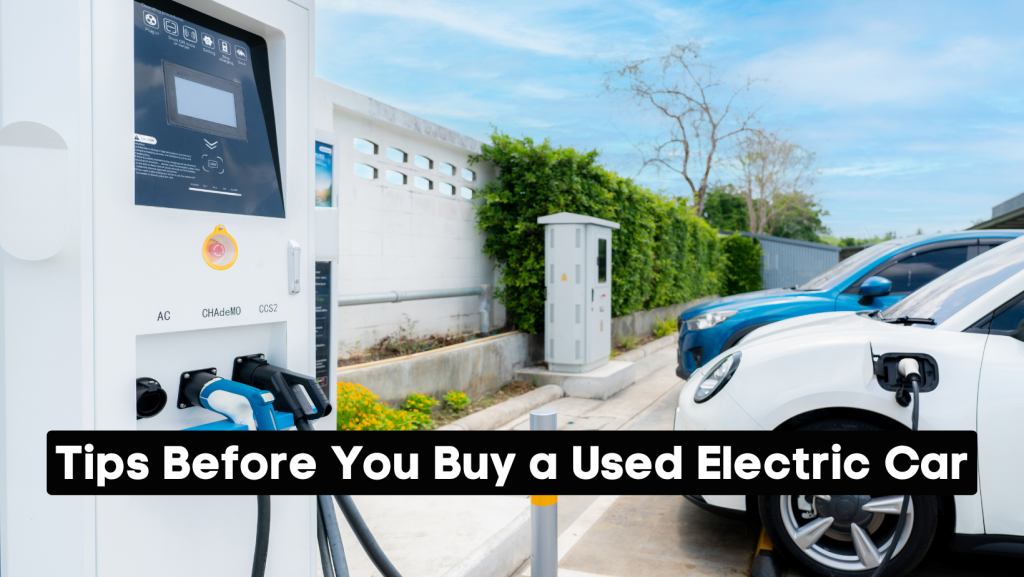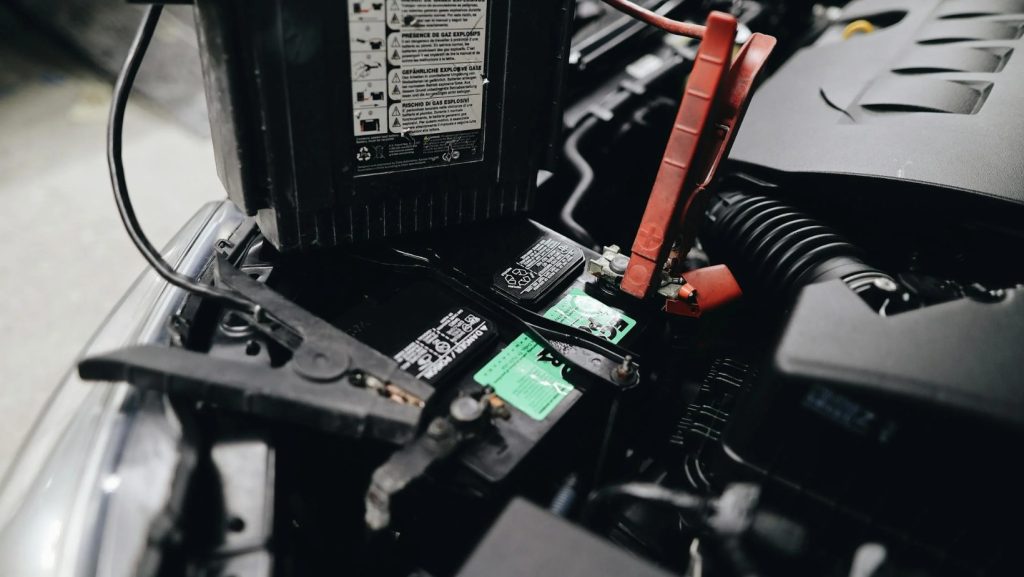Used electric vehicles cost less now than they did over the last several years. Budget-conscious buyers find them an attractive option, and a used electric car could give you similar benefits at a much lower price.
Smart buyers need to think over several significant factors when shopping for a used electric car. The decision goes beyond comparing price tags – you’ll need to check battery health, charging setup, maintenance records and specific features for each model.
Here are five key tips to help you make a smart used EV purchase. You’ll discover ways to review battery condition and understand charging needs. These tips will also help you avoid mistakes that new electric vehicle buyers often make.

Research Your Used EV Options
Research into used electric vehicles should start with a clear grasp of the basic differences between EV types. A recent survey revealed that 67% of EV buyers see environmental effects as their main reason to purchase.
Understanding different EV types and models
Three main types of electric vehicles exist in the market:
- Battery Electric Vehicles (BEVs): Fully electric with zero emissions
- Plug-in Hybrid Electric Vehicles (PHEVs): Combine electric and gas power
- Hybrid Electric Vehicles (HEVs): Use electric assistance with a gas engine
Comparing range capabilities and battery sizes
Range anxiety worries many buyers, but today’s EVs deliver impressive performance. Most current models can travel over 200 miles on a single charge. The Tesla Model 3 stands out with ranges from 254 to 348 miles, depending on which version you choose. Smaller EVs typically come with 60-75 kWh batteries, while larger SUVs pack more power with 100-120 kWh batteries.
Evaluating manufacturer reputation and support
Tesla leads the market, but other brands now offer great alternatives at better prices. The satisfaction level speaks volumes – 95% of EV owners actively encourage others to make the switch. The best brands offer strong service networks and detailed warranty coverage. Most manufacturers back their batteries with at least 8 years or 100,000 miles of warranty protection.
Your research must include charging infrastructure availability since 36% of current EV owners want better range in their next vehicle. Sedans and SUVs make the most popular choices. These body styles blend practicality and efficiency perfectly.
Assess Battery Health and Performance
The battery works as the heart of any used electric car. Its condition affects both performance and value. You need to look at three critical things to evaluate a used EV’s battery.
How to check battery degradation
Start by checking the battery’s current capacity against its original specs. EVs typically lose 2-3% capacity each year. Tesla’s batteries keep about 90% capacity even after 100,000 miles. Look out for these signs of battery health:
- Lower driving range than original specs
- Charging takes longer than usual
- The car doesn’t accelerate as well as it should
- Dashboard shows warning lights or error messages
- Battery charge readings jump around

Understanding battery warranty coverage
Federal rules say manufacturers must give at least eight-year battery warranties. The terms differ a lot between brands. Some brands only replace completely failed batteries. Tesla, Nissan, and Volkswagen will give you a new battery if capacity drops below 60-70% during warranty.
Reading battery health reports
New EVs come with smart Battery Management Systems (BMS) that tell you detailed health info. You can see this data through:
The car’s dashboard shows estimated range and charge level. Getting a diagnostic scan at a certified service center gives you the full picture – it takes just 15 minutes. Manufacturer apps show detailed battery health info, and third-party diagnostic tools can give you even more data.
Note that a good battery should give you close to its EPA-rated range at full charge. If you see big differences, ask a professional to check before you buy.
Plan Your Charging Infrastructure
A proper charging infrastructure at home is vital before you purchase a used electric car. Home charging gives EV owners convenience and saves money compared to public charging stations.
Home charging setup requirements
Your home charging setup can use two main options:
- Level 1 Charging: Standard 120V outlets add 4-5 miles of range per hour
- Level 2 Charging: 240V installation charges 3-4 times faster than Level 1
Professional electricians must evaluate your home’s electrical capacity before Level 2 installation. Modern homes usually have 200-amp service panels. Older properties might need electrical upgrades. Your installation costs will range between INR 67,504 and INR 210,951, based on your home’s configuration.
Public charging availability in your area
The public charging network across India grows faster, reaching 12,146 operational stations by February 2024. Maharashtra leads with 3,079 stations while Delhi follows with 1,886 stations. Apps like Plugshare and ChargePoint help drivers find nearby stations and check availability status.
Estimating charging costs and savings
Home charging remains the most budget-friendly choice at INR 4.22 per mile, while gas-powered vehicles cost INR 10.97 per mile. Your electricity bills might see an increase of INR 4,725 monthly if you drive 13,476 miles yearly.
Utility companies provide reduced rates during off-peak hours, making nighttime charging more economical. Home charging calculators help you determine exact costs based on your car’s battery size and local power rates.
Verify Service and Maintenance History
Electric vehicles need less maintenance than traditional cars, but checking the service history is a vital part of buying a used electric car. EVs need servicing every 12 months or 12,000 miles based on manufacturer’s guidelines.
Important service records to check
You should ask for these key documents before buying a used EV:
- Complete service history and maintenance records
- Software update logs
- Battery health reports
- MOT history (if applicable)
- Accident records
- Previous ownership details
Finding qualified EV mechanics
EVs need specialized technicians because not all mechanics can work on them. These experts must understand high-voltage systems (400-700 volts) and renew their certifications yearly. The best approach is to look for mechanics with ASE certification specifically for electric vehicles. Dealership service centers often provide reliable expertise since manufacturers train their entire service network in EV maintenance.
Common maintenance issues to look for
EVs have fewer moving parts than traditional vehicles but face their own maintenance challenges. The biggest problems include battery degradation, increased tire wear from higher vehicle weight, and brake system issues due to regenerative braking underuse. Regular maintenance includes:
Essential Checks: Battery health inspection, tire pressure monitoring, brake system evaluation, and cooling system examination. The vehicle needs regular software updates and charging port inspections to perform at its best.
Cost Considerations: EVs cost less to maintain regularly, but specialized repairs can be expensive. The battery coolant systems need regular checks, and tires might need replacement more often because of the vehicle’s extra weight.
It’s worth mentioning that consistent maintenance records show a well-maintained vehicle. The battery thermal management system maintenance and any recurring software issues deserve special attention when you review the service history.
Conclusion
Buying a used electric car needs you to think over several factors. The savings and environmental benefits make it worth your time. You’ll need a full picture of the battery’s health, charging setup, and service history to make a confident decision.
A used EV that’s managed to keep good condition can be great value. Modern batteries still keep 90% capacity even after lots of miles. You’ll need to plan your charging setup smartly. This means either installing a home charger or mapping out public charging stations to make your switch to electric driving easier.
These tips will boost your confidence when you shop for a used EV. Look for cars with complete service records and proven battery health. Find charging options that fit your daily routine. Your research into everything about the car will help you find a reliable used EV that’s good for both your wallet and the environment.
FAQs
How long do electric cars typically last?
Electric cars can last as long as or even longer than traditional vehicles. Most EVs can achieve 100,000 to 200,000 miles or a lifespan of 10 to 20 years before requiring significant battery replacements, depending on driving habits and maintenance.
What are the key factors to consider when buying a used electric car?
When buying a used electric car, consider factors such as battery health and performance, charging infrastructure availability, maintenance history, range capabilities, and manufacturer reputation. It’s also important to evaluate the overall cost of ownership and available warranty coverage.
What type of maintenance do electric cars require?
Electric cars generally require less maintenance than traditional vehicles. Key maintenance tasks include regular tire pressure checks, battery coolant level inspections, and examinations of the power inverter, cabin heater, and charger. It’s also important to keep the vehicle’s software up-to-date and have the battery health assessed periodically.
How can I assess the battery health of a used electric vehicle?
To assess battery health, check the current capacity compared to original specifications, look for reduced driving range, longer charging times, or unexpected performance drops. Most EVs lose about 2-3% capacity annually. You can also request a diagnostic scan at a certified service center or use manufacturer apps to access detailed battery health information.
What are the charging options for electric cars?
Electric cars can be charged at home or at public charging stations. Home charging options include Level 1 charging using standard 120V outlets (adding 4-5 miles of range per hour) and Level 2 charging requiring 240V installation (3-4 times faster). Public charging networks are expanding, with apps available to locate nearby stations. Home charging is typically the most economical option.